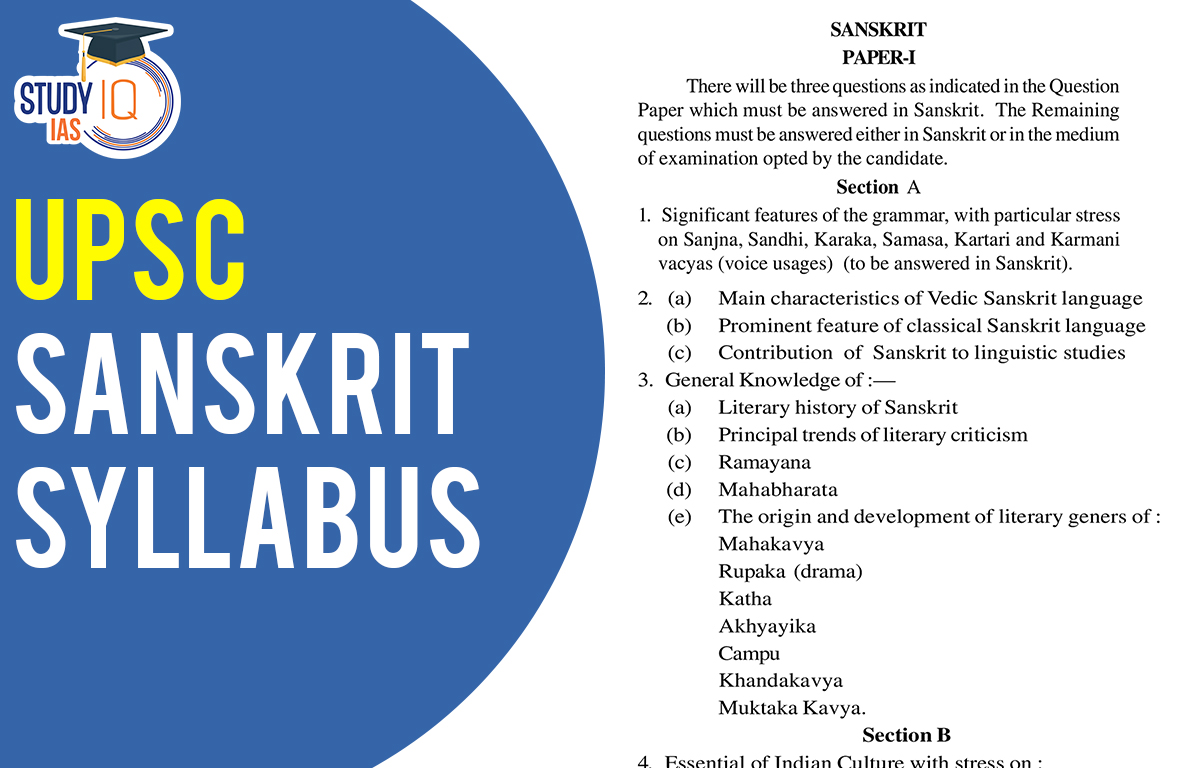Table of Contents
Sanskrit is one of the world’s oldest languages and is known as the mother of all languages. Presently, not commonly spoken today, Sanskrit is one of India’s 22 official languages and is considered a classical language. Its literature has a strong history in Indian culture and is still studied by scholars. Sanskrit literature shows the rich culture and thinking of ancient India. Its detailed grammar and different types of writing show the philosophical, religious, and artistic ideas of its writers. This literature includes famous works like the Ramayana, the plays of Kalidasa and Bhasa, and the philosophical texts of the Upanishads and Bhagavad Gita. These works highlight the rich thought and creativity of the Indian subcontinent. The syllabus of sanskrit is designed to test how well candidates understand, analyze, and show Sanskrit literary skills.
UPSC Sanskrit Syllabus 2024
The UPSC Civil Services Examination is divided into three stages: preliminary, mains, and interview. For the UPSC IAS mains exam, candidates must select one optional Subject. It is very important in determining an aspirant’s ranking in the IAS exam. Current statistics indicate that the success rate of Literature disciplines is increasing with time.
Sanskrit is only used in a few areas in India, but it is included in the UPSC Mains optional courses list because it is a classical language.
The complete UPSC Sanskrit Literature Syllabus for the Civil Services Exam is provided for you in this article that’s required to prepare for the UPSC Syllabus.
UPSC Sanskrit Literature Syllabus
Only those who have studied Sanskrit as part of their education should choose this optional because it is a highly specialised language that is not generally utilised. In contrast to other optional literature courses, UPSC clearly states which questions must be answered in Sanskrit and which must be answered in the mains medium of the candidate’s choice. The Devanagari script must be used to write the Sanskrit responses that are required.
In the UPSC Mains, Sanskrit Literature is divided into two papers (Paper 1 and Paper 2). Each paper in the Civil Services Examination carries 250 marks, for a total of 500 marks.
UPSC Sanskrit Literature Syllabus Paper 1
Important Instructions on Writing Language for Paper I: In Paper I, there will be three questions that must be answered in Sanskrit. The rest of the questions can be answered either in Sanskrit or in the language chosen by the candidate for the exam. Below is the Sanskrit Literature Paper-1 syllabus for the civil services exam:
| UPSC Sanskrit Literature Syllabus Paper 1 |
| Section 1 |
Features of the grammar, with particular stress on Sanjna, Sandhi, Karaka, Samasa, Kartari and Karmani vacyas (voice usages) (to be answered in Sanskrit).
|
| Section B |
|
UPSC Sanskrit Literature Syllabus Paper 2
Important Instructions for Writing Language in Paper II
- In Section A, you must answer questions from Group 4 in Sanskrit only. For questions from Groups 1, 2, and 3, you have the option to select in either Sanskrit or the language you selected. In Section B, you will need to read the selected texts on your own. For questions from Groups 1 and 2, answer in Sanskrit only. For questions from Groups 3 and 4, you can choose to answer in either Sanskrit or the language you selected. Below is the Sanskrit Literature Paper-2 syllabus:
| UPSC Sanskrit Literature syllabus paper 2 |
| Questions from Group 4 must be answered in Sanskrit only. Questions from Groups 1, 2, and 3 can be answered either in Sanskrit or in the language chosen by the candidate. Section A |
| Group 1 |
|
| Group 2 |
|
| Group 3 |
|
| Group 4 |
|
| Section B | |
| Group 1 |
|
| Group 2 |
|
| Group 3 |
|
| Group 4 |
|
This article discusses the complete UPSC Sanskrit Literature Syllabus for UPSC/IAS. Candidates can download the PDF in this article. For more details related to UPSC Examination; students can visit the official website of StudyIQ UPSC Online Coaching.
UPSC Sanskrit Literature 2024 Exam Pattern
Exam pattern explains the exam structure, marking scheme, and sections of the exam, duration and marks distribution, helping you plan your preparation. check out the table below.
| UPSC Sanskrit Literature 2024 | |
| Mains | Paper VI and Paper VII |
| Subjects | Sanskrit Literature Optional
|
| Total Marks | 500 |
| Duration | 3 Hours/paper |
| Total Sections | Section A & Section B |
| Total Questions | 8 |
| Mandaory question | Questions No. 1 and 5 |
| Marks Distribution |
|
| Language | Sanskrit |
Preparation Tips for UPSC Sanskrit Literature 2024
Candidates can improve their marks in Sanskrit literature by using the following strategies:
- Begin by analyzing the syllabus and relevant study materials.
- Understand the exam patterns to determine which topics you need to focus on.
- After reading the books, write summaries in your own words and take expert reviews to understand the language
- Regular practice is essential to improve your Sanskrit language skills.
- Comparing Sanskrit literature with other Indian and global works can provide a good understanding
- Regularly practice writing essays, critical commentaries, and summaries to enhance your writing skills and time management.
- Finally, take guidance from Sanskrit scholars, teachers, or mentors to discuss any doubts, receive feedback, and improve your overall preparation.


 China's Salami Slicing Tactics
China's Salami Slicing Tactics
 Comprehensive Remote Sensing Observation...
Comprehensive Remote Sensing Observation...
 Tiger Reserves in Madhya Pradesh List an...
Tiger Reserves in Madhya Pradesh List an...





















